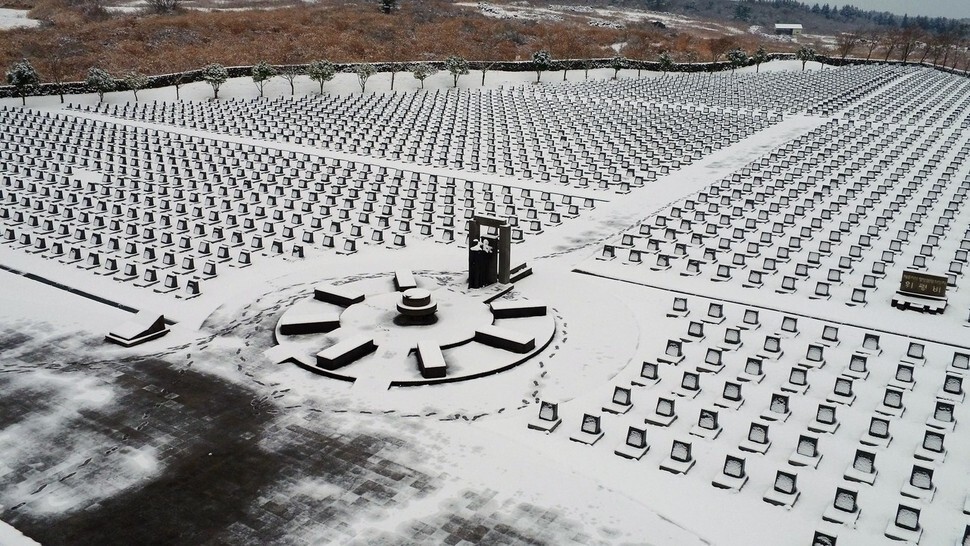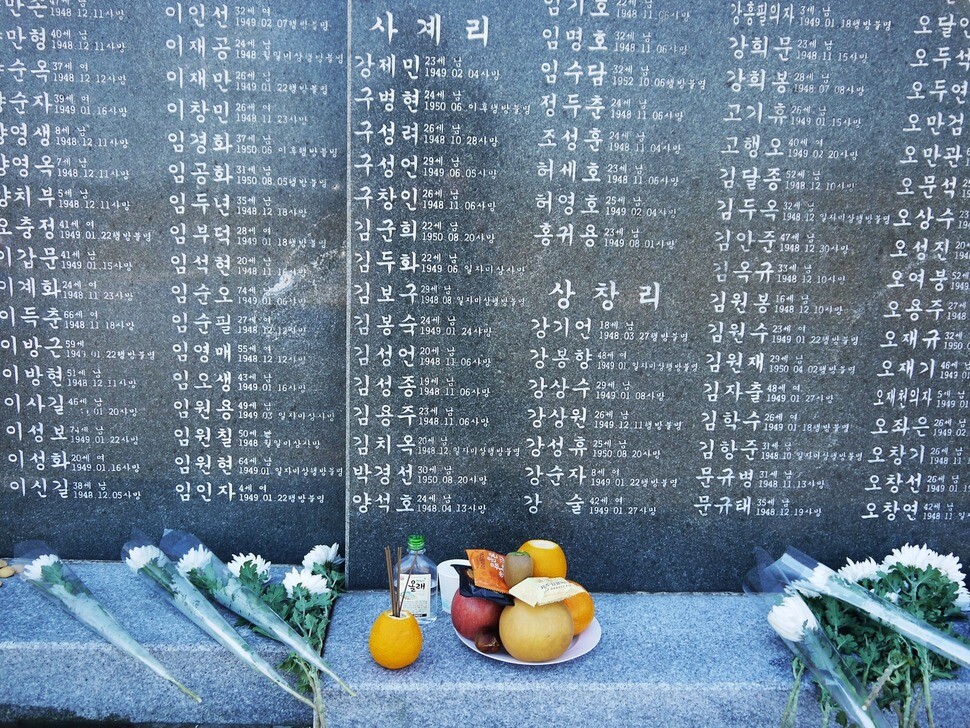hankyoreh
Links to other country sites 다른 나라 사이트 링크
Epilogue to the Special Series of the Jeju April 3 Massacre

On Jan. 20, I went to see the markers for missing persons at Jeju April 3rd Peace Park in Jeju City’s Bonggae neighborhood. A total of 3,896 markers can be found there, including people who were taken to mainland prisons (like the former Jeju April 3 prisoners effectively exonerated in a retrial on Jan. 17) and never returned, as well as others who went missing on Jeju Island. Standing out among the marker are those with an inscription reading “child of [person’s name]”; these are the markers for those who disappeared shortly after their birth. Stepping out from the markers and down past the memorial ceremony altar, I encountered a circular monument bearing a wall of inscribed names. The sheer number of names – over 15,000 in all – gives an indication of the scale of the Jeju April 3 death toll.
Launched in Mar. 2018 as a special series for Jeju April 3’s 70th anniversary, the “Ask the Camellia” series now ends in the New Year. A total of 20 installments have been published, including a first set of five in the print newspaper (Mar. 20–Apr. 3, 2018) and a second set of 15 in the online edition (Sept. 23, 2018–Jan. 21, 2019).

In various parts of Jeju Island as well as Seoul and Japan, I met elderly men and women – grandfathers, grandmothers, and uncles – who are living with the memory of Jeju April 3. Most of them carry heartfelt stories with them. “If I were to write about it,” they say, “it could fill a book.” Meeting them, I could sense that Jeju April 3 is not simply an incident from seven decades ago, but something that lurks within their consciousness to this day.
A lot of issues remain to be resolved. Candidates in the last presidential election pledged to provide compensation for the victims of Jeju April 3 and their family members. An amendment to the Special Jeju April 3 Act currently pending in the National Assembly would invalidate the court-martial judgments and address the issue of compensation for victims, but its passage appears a long way off. Soldiers and police who died in the line of duty receive respectful treatment, as do victims from right-wing groups. Some have had their names expunged from the monument and are disqualified as “victims” because of their “guerrilla activities.” If we are to talk of reconciliation and co-existence, we need the generosity to at least etch their names.
Last year, singer An Chi-hwan released a song about Jeju April 3 entitled “April Camellia.” It includes the lines, “I don’t know about these things / I don’t know about the deaths / I can’t know about that sadness.”
Many thanks go out to the research office of the Jeju April 3 Peace Foundation and the Jeju April 3 Research Institute for their generosity in providing materials and advice during this series.
By Huh Ho-joon, Jeju correspondent
Please direct comments or questions to [english@hani.co.kr]

Editorial・opinion
![[Column] Park Geun-hye déjà vu in Yoon Suk-yeol [Column] Park Geun-hye déjà vu in Yoon Suk-yeol](https://flexible.img.hani.co.kr/flexible/normal/500/300/imgdb/original/2024/0424/651713945113788.jpg) [Column] Park Geun-hye déjà vu in Yoon Suk-yeol
[Column] Park Geun-hye déjà vu in Yoon Suk-yeol![[Editorial] New weight of N. Korea’s nuclear threats makes dialogue all the more urgent [Editorial] New weight of N. Korea’s nuclear threats makes dialogue all the more urgent](https://flexible.img.hani.co.kr/flexible/normal/500/300/imgdb/original/2024/0424/7317139454662664.jpg) [Editorial] New weight of N. Korea’s nuclear threats makes dialogue all the more urgent
[Editorial] New weight of N. Korea’s nuclear threats makes dialogue all the more urgent- [Guest essay] The real reason Korea’s new right wants to dub Rhee a founding father
- [Column] ‘Choson’: Is it time we start referring to N. Korea in its own terms?
- [Editorial] Japan’s rewriting of history with Korea has gone too far
- [Column] The president’s questionable capacity for dialogue
- [Column] Are chaebol firms just pizza pies for families to divvy up as they please?
- [Column] Has Korea, too, crossed the Rubicon on China?
- [Correspondent’s column] In Japan’s alliance with US, echoes of its past alliances with UK
- [Editorial] Does Yoon think the Korean public is wrong?
Most viewed articles
- 1‘We must say no’: Seoul defense chief on Korean, USFK involvement in hypothetical Taiwan crisis
- 2N. Korean delegation’s trip to Iran shows how Pyongyang is leveraging ties with Moscow
- 3Amnesty notes ‘erosion’ of freedom of expression in Korea in annual human rights report
- 4[Column] Park Geun-hye déjà vu in Yoon Suk-yeol
- 5‘Weddingflation’ breaks the bank for Korean couples-to-be
- 6[Reportage] On US campuses, student risk arrest as they call for divestment from Israel
- 7[Editorial] New weight of N. Korea’s nuclear threats makes dialogue all the more urgent
- 8Why Korea shouldn’t welcome Japan’s newly beefed up defense cooperation with US
- 9[Guest essay] The real reason Korea’s new right wants to dub Rhee a founding father
- 10Will NewJeans end up collateral damage in internal feud at K-pop juggernaut Hybe?